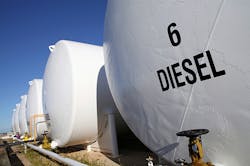Is your diesel truck struggling with poor engine performance, sluggish acceleration or reduced fuel economy? You might have a problem with your exhaust gas recirculation system. That might seem like a complicated problem to fix – but it doesn’t have to be.
Most diesel engines in the U.S. use a combination of technologies to reduce emissions. Usually, there will be a diesel particulate filter (DPF), selective catalytic reduction (SCR) and an exhaust gas recirculation (EGR) system. An effective EGR system paired with these technologies will reduce oxides of nitrogen (NOx) in the exhaust for cleaner emissions.
While the basic concept of how EGR helps reduce NOx emission is fairly straightforward, the problems it creates are a bit more complex. EGR systems need care and maintenance to prevent fouling, reduce downtime and keep engines running smoothly at full efficiency.
NOx formation progresses faster at high combustion temperatures. By sending some exhaust gas back to the cylinders and reducing oxygen in the burn, EGR cools combustion to a level that helps reduce NOx to the applicable emission standards.
However, EGR also makes engines more susceptible to severe fouling. That “fouling deposit layer” is a blend of particulates and hydrocarbons, which sticks to heat-exchanger surfaces. Thermal efficiency, engine performance and reliability can drop as these deposits build.
The EGR valve itself can foul, resulting in engine hesitation or poor fuel economy that might seem like a vacuum line problem. Poor efficiency in those components can reduce fuel economy and lead to costly repairs and downtime.
Even though today’s newer diesel engines primarily use a combination of EGR and SCR to hit emission targets and reduce problems caused by EGR-only engines, about 15% of exhaust gases still must be returned to the cylinder. For this reason, fuel quality makes a huge difference in reducing soot production.
A high-quality fuel that contains detergents and injection stabilizers will result in cleaner fuel injectors, less fuel breakdown under pressure and heat, and better spray patterns that produce more complete combustion and less soot at the very beginning of the process.
Additives in premium diesel fuel help reduce fouling of the EGR valve, EGR cooler and turbocharger.
There are also some basic maintenance tips that may help minimize soot and ash buildup in your EGR system:
- Reduce engine idling time when possible and maintain a regular maintenance schedule.
- Consider a high-quality, low-ash engine oil to help with engine performance and operability.
- Conduct an oil analysis on every drain cycle to look for early signs of engine trouble is also recommended, and
- When you see any engine warning lights or signs of engine hesitation, address it quickly to help avoid costly repairs or extended downtime.
The maintenance tips above, as well as running a premium diesel fuel, will help provide you with a cleaner burn, which should always be your goal for engine longevity and fleet efficiency.
About the Author
Ron Jessen
Director of Product Management and Business Development
Ron Jessen was director of product management and business development for CHS. Jessen retired in 2024.
